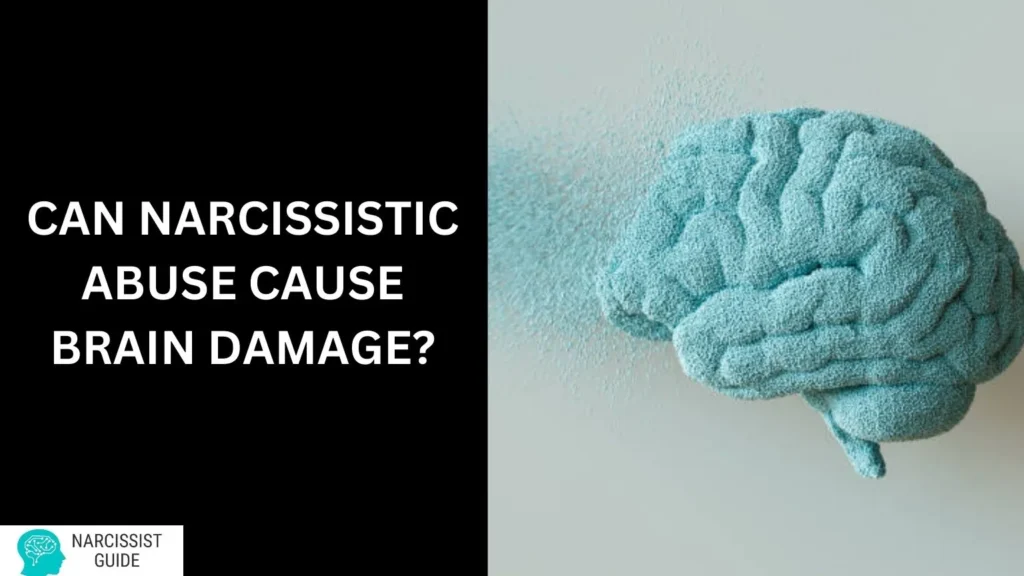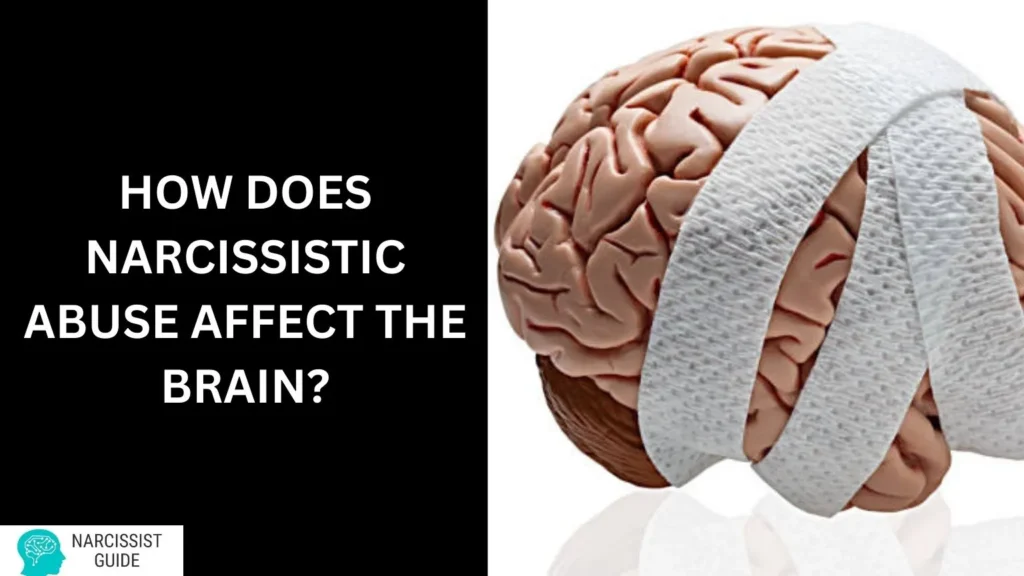Can Narcissistic Abuse Cause Brain Damage? (Guide)
Narcissistic abuse is a form of psychological and emotional manipulation, often inflicted by individuals with narcissistic personality traits.
While the effects of narcissistic abuse are widely recognized in terms of emotional and mental health, there’s growing concern about its potential impact on the brain.
Can narcissistic abuse cause brain damage? In this article, we’ll explore the complex relationship between narcissistic abuse and its long-term consequences on brain function and overall mental well-being.

Understanding Narcissistic Abuse
Narcissistic abuse typically occurs in relationships where one person holds significant power over another, employing manipulation, gaslighting, and emotional control to maintain dominance.
Victims often experience chronic stress, anxiety, depression, and even physical symptoms as a result of prolonged exposure to this toxic behavior.
Key Traits of Narcissistic Abuse
- Gaslighting: Making the victim doubt their reality.
- Emotional manipulation: Using fear, guilt, or shame to control.
- Isolation: Restricting the victim’s contact with friends or family.
- Constant criticism: Undermining the victim’s self-esteem.
How Does Narcissistic Abuse Affect the Brain?

Narcissistic abuse can have significant and lasting effects on the brain, primarily due to the chronic stress and emotional trauma involved. Here are some key ways it impacts brain function and structure:
The Stress Response
When exposed to narcissistic abuse, the brain enters a prolonged state of stress. Our brains are designed to handle short-term stress, known as the “fight or flight” response.
However, chronic stress from emotional abuse can have detrimental effects on the brain’s structure and function.
- Cortisol and Adrenaline: These stress hormones are released when a person experiences emotional trauma. Prolonged release of cortisol can lead to inflammation in the brain, which negatively affects cognitive function.
- Amygdala: The amygdala, the brain’s emotional center, can become overactive in victims of abuse, leading to heightened anxiety and fear responses.
Neuroplasticity and Trauma
One of the brain’s most remarkable features is neuroplasticity, which allows it to rewire itself in response to new experiences.
Unfortunately, this same process can lead to negative rewiring due to traumatic experiences like narcissistic abuse.
Over time, the brain may adapt to the abuser’s manipulation, making it harder for the victim to escape the toxic relationship.
Can Narcissistic Abuse Cause Brain Damage?
While the term “brain damage” typically refers to physical injuries or severe trauma, narcissistic abuse can still lead to profound changes in brain function.
Although it may not cause the same kind of damage as a head injury, chronic emotional trauma can affect regions of the brain responsible for emotional regulation, memory, and decision-making.
- Hippocampus: Research suggests that long-term exposure to narcissistic abuse can shrink the hippocampus, the part of the brain responsible for memory and learning. This can result in memory issues, difficulty concentrating, and trouble learning new information.
- Prefrontal Cortex: The prefrontal cortex, which governs rational thought and decision-making, may become impaired due to sustained stress and trauma, making it difficult for victims to make clear, reasoned choices.
- Neural Pathways: Repeated emotional trauma can create negative thought patterns, which can become deeply ingrained in the brain’s neural pathways.
Signs of Cognitive Decline from Narcissistic Abuse
If you or someone you know has experienced narcissistic abuse, certain cognitive signs may indicate the brain has been affected:
- Memory Loss: Difficulty recalling information or events, especially related to the abuse.
- Confusion: Feeling foggy-headed or unable to focus on simple tasks.
- Emotional Instability: Extreme anxiety, depression, or mood swings can signal that the brain’s emotional regulation systems are compromised.
- Indecisiveness: Trouble making decisions, even minor ones, can stem from damage to the brain’s decision-making centers.
Can the Brain Recover from Narcissistic Abuse?

While narcissistic abuse can have profound effects on brain function, the good news is that the brain has a tremendous capacity to heal. With time, therapy, and self-care, many individuals can regain cognitive function and emotional balance.
Healing the Brain After Narcissistic Abuse
- Therapy: Cognitive Behavioral Therapy (CBT) and trauma-informed therapy can help victims reframe their thoughts and heal from trauma.
- Mindfulness and Meditation: Practices like mindfulness and meditation can reduce stress and promote brain healing by calming the overactive amygdala and stimulating the prefrontal cortex.
- Exercise: Regular physical activity has been shown to stimulate neurogenesis (the growth of new neurons), which can aid in recovery from emotional trauma.
- Social Support: Rebuilding social connections and seeking emotional support from trusted friends and family can help combat the isolation caused by narcissistic abuse.
- Healthy Lifestyle Choices: A diet rich in nutrients, regular sleep, and stress-reducing activities can further promote brain healing.
Seeking Professional Help
It’s essential to seek professional guidance when healing from narcissistic abuse, especially if you notice symptoms of brain damage or cognitive decline. A licensed therapist or psychologist can offer strategies and interventions to help rebuild mental and emotional health.
Long-Term Consequences of Narcissistic Abuse
Though narcissistic abuse can lead to significant emotional and cognitive consequences, it’s important to recognize that not everyone will experience the same level of impact. For some, the damage may be temporary, while others may face long-term challenges.
Emotional Scars and PTSD
In addition to potential brain damage, victims of narcissistic abuse may develop Post-Traumatic Stress Disorder (PTSD) or Complex PTSD (C-PTSD). These conditions can further exacerbate emotional regulation issues and cognitive difficulties.
Impact on Relationships and Self-Esteem
Victims of narcissistic abuse often struggle with trust and self-worth in future relationships. The emotional and cognitive toll of abuse can lead to ongoing struggles with intimacy, vulnerability, and self-confidence.
People also ask
What does narcissistic abuse do to your brain?
Narcissistic abuse can significantly impact your brain, leading to several adverse effects:
Chronic Stress Response: Prolonged exposure to narcissistic abuse activates the stress response, releasing high levels of cortisol, which can lead to inflammation and damage to brain cells.
Impaired Cognitive Function: The hippocampus, responsible for memory and learning, may shrink, resulting in memory problems and difficulty concentrating.
Emotional Regulation Issues: The amygdala, the brain’s emotional center, can become overactive, causing heightened anxiety and emotional instability.
Negative Thought Patterns: Repeated emotional trauma can create harmful neural pathways, reinforcing negative beliefs and increasing feelings of worthlessness.
Decision-Making Difficulties: Damage to the prefrontal cortex can impair rational thinking and decision-making, making it hard to navigate daily life.
What mental illness is caused by narcissistic abuse?
Narcissistic abuse can lead to several mental health issues, including:
Post-Traumatic Stress Disorder (PTSD): Victims may experience flashbacks, nightmares, and severe anxiety due to the trauma inflicted by the abuser.
Complex PTSD (C-PTSD): This condition, resulting from prolonged trauma, includes symptoms like emotional dysregulation, difficulty in relationships, and persistent feelings of hopelessness.
Depression: Constant manipulation and emotional turmoil can lead to persistent sadness, loss of interest in activities, and feelings of worthlessness.
Anxiety Disorders: Victims often experience heightened anxiety, panic attacks, and an ongoing sense of fear or dread.
Low Self-Esteem: Continuous criticism and belittlement can severely impact self-worth, leading to feelings of inadequacy and self-doubt.
What happens to your body with narcissistic abuse?
Narcissistic abuse can have profound effects on the body, leading to both physical and psychological symptoms:
Chronic Stress Response: The ongoing emotional turmoil triggers a constant state of stress, resulting in elevated cortisol levels, which can lead to fatigue and a weakened immune system.
Physical Health Issues: Prolonged stress is linked to various health problems, including headaches, gastrointestinal issues, heart disease, and chronic pain conditions.
Sleep Disturbances: Victims often experience insomnia or disrupted sleep patterns, leading to exhaustion and further health complications.
Weight Changes: Stress and emotional distress can lead to weight gain or loss due to changes in appetite and metabolism.
Muscle Tension and Pain: Ongoing anxiety and tension can cause muscle stiffness, pain, and other physical discomforts.
Conclusion: Can Narcissistic Abuse Cause Brain Damage?
In conclusion, while narcissistic abuse may not result in the kind of physical brain damage caused by head trauma, it can still lead to significant changes in brain function and mental health.
Chronic stress, emotional manipulation, and trauma can impair memory, decision-making, and emotional regulation.
The good news is that with time, support, and proper treatment, many victims can recover and rebuild their cognitive and emotional well-being.

I’m Dr. James, and I’m glad you’re here. With years of experience in understanding and addressing the complexities of narcissistic behavior, I’ve dedicated my career to helping individuals navigate the challenging dynamics that come with narcissism, whether it’s in personal relationships, workplaces, or family settings.






